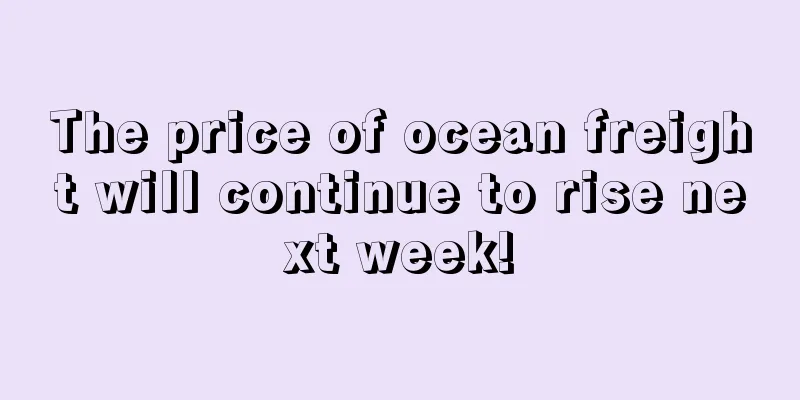Sellers: Panic, Brazil's $50 tax-free policy for cross-border purchases has been cancelled? Here comes the latest development

|
In the past week, several self-media outlets have published articles stating that Brazil will cancel its current cross-border tax-free policy within US$50 in May, and will require that all incoming e-commerce packages be taxed at 60%. As soon as the news came out , it caused quite a panic in the cross-border circle.
The spread of a lot of false information also reflects people's concerns about the adjustment of Brazil's cross-border package entry policy . For this reason, combined with official communications with Brazilian government officials, congressmen, and the Brazilian E-commerce Industry Association in the past two months , as well as information from visits by ordinary people, An Jun compiled the latest situation on this policy adjustment storm .
Review of the Adjustment of Brazil's E-commerce Package Entry Policy
1. From February 10 to March 17, Luciano Hang, founder of Havan, a well-known offline retail giant in Brazil, and Alexandre Ostrowiecki, founder of Multilaser, spoke to the media several times, stating the impact and influence of cross-border duty-free entry on traditional retail business. They believed that the duty-free entry of cross-border packages was unfair competition for local offline retailers in Brazil, and called on the government to cancel this duty-free policy and charge an import tax of 60% for all incoming e-commerce packages ;
2. On March 22 , Bruno , head of Anjun Brazil, held a video conference with federal senator and proposal leader Flavio Bolsonaro ( son of the president ) and executive chairman of Brazil Havan Luciano Hang. They exchanged views and opinions on the pros and cons of Brazil's $50 tax-free entry policy and expressed their respective demands. Bruno said: "Irregular declaration behavior is a problem within the government's policy supervision scope, and improvements should be made in terms of supervision methods and technical means, but this is not a reason to directly cancel the people's right to purchase cross-border goods tax-free within $50, and the existing online shopping package entry policy should not be changed by increasing taxes."
3. On March 29 , Brazilian civil groups held online real-name signature campaigns in various states of Brazil to oppose the cancellation of the tax-free policy for cross-border parcels within 50 US dollars. As of April 5, the number of real-name signatures reached 60,000.
4. On April 11, the Brazilian Competitive Parliamentary Front held a rally in Sao Paulo. The meeting was convened by Luciano Hang, and the participants included congressmen, the secretary of the Federal Tax Bureau, and dozens of representatives of various industry associations and businessmen. The meeting announced the research data on the impact of cross-border e-commerce packages on Brazil's local retail industry and local industry, and stated that some cross-border e-commerce packages evaded taxes and government supervision by entering the country in an irregular manner (low declared value, false or concealed real product names, evasion of regulatory licensing documents, counterfeit and counterfeit products, etc.), and once again expressed their demands to the government through the media; and the House of Representatives members took the lead in promoting policy amendment proposals, officially moving towards amending regulations;
5. Starting from mid-April, the Brazilian federal government established a new e-commerce entry policy formulation project evaluation group. Brazilian customs, national tax bureau and other relevant entry supervision departments began to prepare for system improvements under the new supervision policy conditions. It is planned to connect the data of major payment and collection companies in Brazil to the customs and national tax supervision system, and connect the actual transaction price of cross-border e-commerce with the entry declaration price of the package, providing technical support for the upgrade of government supervision methods;
6. On May 18, Roberto de Lucena, a member of the House of Representatives, made a general statement to the House of Representatives, mainly about the impact of e -commerce websites on local industries , and called for the formulation of new policies to stop the duty-free entry of $50 for cross-border e-commerce . He also said that he would have a dialogue and communication with the Brazilian Federal Taxation Bureau and President Jair Bolsonaro on this issue from May 25 to 26;
7. On May 19 , Brazilian Economy Minister Paulo Guedes expressed his support for the taxation of international online shopping packages at the "Brazil Economic Outlook" seminar. Paulo Guedes said at the event: "We hope that the rules of the game are the same for everyone, but now it is clear that someone falsified the value of the goods when declaring entry, which is a fraudulent act. "
8. On May 21 , Brazilian President Jair Bolsonaro said on his personal social network that he would not sign a temporary measure to impose taxes on incoming packages from international shopping platforms. He said: "I will not sign any PM (note: temporary emergency measures) to tax purchases on apps such as Shopee, AliExpress, Shein, etc. The way out for possible violations in this service or other services should be inspections, not tax increases. "
In this regard, An Jun predicts that in the next few weeks or months, the development of the incident may have the following possibilities :
A. Brazilian President Jair Bolsonaro will hold a meeting with cabinet ministers on whether to cancel the $50 duty-free entry policy. The meeting will determine what changes the government will make next. According to President Jair Bolsonaro's social media statement, he will not sign this MP, but will discuss with ministers how to strengthen entry supervision measures under existing regulations to avoid non-compliant declarations ;
B. The Senate will vote on whether to support the amendment of the e-commerce package entry policy and legislate, but this legislative process will be long and it is expected to take 4-6 months to complete all procedures ;
C. Excluding the possibility of the government taking temporary emergency measures, even if the legislature can pass a new adjustment bill, there will be a 90-day policy transition and adaptation period from the announcement of the new policy to its formal implementation, during which the existing policy can still be implemented ;
D. Both the Brazilian government and the legislature have reached a consensus on one aspect , that is, under the existing laws and regulations , the inspection and supervision of customs, taxation, inspection and quarantine, health and safety, and electronic information will be strengthened for non-compliant behaviors in the process of e-commerce package entry declaration. The government will strengthen its efforts in cracking down on counterfeit brands, investigating and punishing under-reporting of prices or false product names, and investigating and punishing the use of false consignee tax number information, and the ratio of goods inspected to taxed is likely to increase.
Four mainstream views in the formulation of new policies
Brazilian government policymakers (government officials and federal lawmakers) are still controversial about the cancellation of the $50 tax-free policy. The main reason is that Brazil's inflation has continued to rise this year, and the cost of living for the people is further rising. The cancellation of the tax-free policy means that the channels for purchasing foreign goods at low prices are restricted. At the same time , this year is the year of the Brazilian presidential election. The purpose of all parties is to gain more votes in the political election by taking advantage of livelihood issues. Therefore, in this storm over whether the tax-free policy for cross-border packages within $50 should be adjusted, various forces represent the positions of different classes . There are currently four main mainstream views:
Type 1 : Local industrial and commercial enterprises They proposed to apply the current tax rate for individual online purchases of more than $50 to all purchase price ranges, that is, to levy an import comprehensive tax of 60% of the purchase value; and to use this measure to protect Brazil's local industry and retail business from being impacted .
The second type : labor interests They advocate : ensuring that cross-border transaction data is connected to the government regulatory system and the transaction process is transparent to the regulatory authorities, implementing low tax rates. That is, personal overseas shopping packages worth less than US$50 will continue to be exempt from import tariffs (II) and industrial product taxes (IPI), but the import integration tax (PIS), social insurance integration tax (CONFINS) and circulation tax (ICMS, also known as value-added tax) will continue to be levied, with a total tax rate of about 31.86%. This interest group is more concerned about tax increases on labor and social security benefits, but does not want the tax burden of cross-border purchases to be too heavy .
The third type : foreign trade importers They proposed that parcels worth less than US$50 should continue to be exempt from customs duties, industrial product taxes, import integration taxes and social security integration taxes, and the government should only collect turnover tax (ICMS, i.e. value-added tax), with an estimated tax rate of 18-21% .
The fourth type : the vast number of cross-border shopping consumers They believe that online shopping has become one of the mainstream shopping methods in the world, especially when the epidemic in Brazil worsened, it played a role in protecting people's livelihood. The entry tax-free policy cannot be denied just because there are various non-compliant exceptions during the entry process ; just because e-commerce shopping has impacted traditional retailers, we must not pass legislation to restrict and suppress cross-border e-commerce. They advocate maintaining the existing tax-free policy for cross-border online shopping packages within US$50 while strengthening government law enforcement and inspection efforts .
Although there is no consensus among various parties , there seems to be a consensus in Brazil that the existing supervision method for cross-border parcel compliance entry needs to be changed and adjusted, and the crackdown on non-compliant cross-border parcel entry needs to be intensified. Brazilian President Bolsonaro stated that he would not sign a PM (temporary emergency measure) to change the existing cross-border parcel entry policy, which objectively shows that he supports the fourth view and safeguards the interests of the majority of cross-border shopping consumers. His statement is beneficial to his participation in this year's presidential election and seeking re-election.
Opportunities for Chinese cross-border platforms and sellers
Judging from the current situation, the attempt of some conservative merchants in Brazil to change the tax-free policy of cross-border parcels within 50 US dollars through media pressure is difficult to achieve. In essence, this storm is the dissatisfaction and challenge of traditional Brazilian channels + retailers represented by Luciano Hang of Havan Company to international Internet e-commerce platforms such as Shopee, Aliexpress, Mercado, etc., trying to maintain their market share and vested interests with more conservative legislative measures. However, it damages the interests of the majority of cross-border shopping consumers and is destined to be difficult to succeed.
This turmoil is both a wake-up call and a new opportunity and challenge for Chinese cross-border e-commerce platforms and sellers that have developed in the past two years relying on the Brazilian market. An Jun also predicts that the Brazilian cross-border e-commerce market may present four changes, challenges and opportunities in the future based on the current actual situation of Brazilian cross -border e-commerce:
First change: This incident has made Brazilian political elites, businessmen and ordinary people realize the advantages of cross-border shopping , thus attracting more attention. At the same time, it has put forward more and higher requirements for cross-border platforms and sellers in terms of after-sales customer service, returns and refunds, fraud prevention, customer complaints, etc.; policy measures to regulate the business operations of cross-border platforms will also be introduced one after another .
Second change: Compliance (truthful declaration) and anti-false package information entry will become the focus of law enforcement agencies in the future . Brazil's customs and tax systems will be directly connected to the platform's (including independent stations) acquiring and payment systems, which means that relying on low declared prices to obtain tax exemptions or less tax will be prohibited, and the sales and supervision process will become more open and transparent.
The third change: Some commodities with sales prices exceeding USD 50 cannot be tax-exempt and therefore have to switch to the model of first-leg ocean shipping + commercial customs clearance + local warehousing and delivery. On the one hand, this is because the local Brazilian market has insufficient supply of some products and there is a high spread. On the other hand, the model of ocean shipping + overseas warehouses + commercial customs clearance and commercial delivery can greatly reduce the logistics cost per customer, which will objectively promote the rise and development of Brazilian overseas warehouses .
The fourth change: International e-commerce platforms entering Brazil will further localize, including local investment , local logistics and the establishment of local supply chain networks. Amazon, Mercado, Shopee and AliExpress, which is exploring local investment in Brazil , will further increase their investment in attracting local sellers. As Shopee said in a statement in Brazil in late March: “Shopee is committed to helping Brazilian SMEs grow and prosper in the online world. More than 85% of sales on our platform come from local Brazilian sellers, including SMEs and brands. At our headquarters in São Paulo and across Brazil , our local teams serve more than 1 million registered Brazilian sellers. We comply with Brazilian laws and regulations and require platform sellers to comply with Brazilian laws and our platform policies . "
postscript
Affected by the global epidemic, Brazil's domestic industrial structure is undergoing in-depth optimization and adjustment with the digital economy as the core. In March, the Brazilian government lowered import tariffs on 11 categories of products, including 3C consumer electronics, by 10%. Reducing entry tax rates is currently the main direction to adapt to industrial structure adjustment and people's livelihood needs. In the process of great changes, the Brazilian market is a rare opportunity for Chinese e-commerce platforms, sellers and service providers, and will surely achieve great things.
The adjustment of the e-commerce package entry policy, which was promoted by some stakeholders in Brazil for their own interests, has attracted great attention from cross-border e-commerce professionals in China and Brazil since the beginning. In the process, the Brazilian media cooperated with relevant stakeholders to rhythmically amplify the impact of Chinese cross-border packages on Brazilian industry and commerce. On this basis, some self-media in China concluded that the Brazilian government will take temporary measures in May to cancel the tax-free policy and impose a 60% tax on Chinese packages entering Brazil, which has caused tension and anxiety in the domestic cross-border circle .
In order to set the record straight, Anjun Logistics expressed the hope that the analysis in this article could help e-commerce platforms, independent site sellers and sellers on third-party platforms that have already or are preparing to develop the Brazilian market, so that everyone can fully understand and grasp the new opportunities bred by the industrial structure adjustment taking the digital economy as an opportunity that is taking place in Brazil ! |
Recommend
What is Bifang e-commerce browser? Bifang e-commerce browser Review, Features
Bifang e-commerce browser (formerly known as e-co...
Sports equipment is hot in the US, with sales up 19% in the first quarter
According to NPD, U.S. spring sports equipment re...
What is 5.11 Tactical? 5.11 Tactical Review, Features
5.11 Tactical is an American brand of clothing tha...
Russia bans plastic tableware, these products are expected to be a big hit!
Recently, Russian Deputy Prime Minister Victoria ...
Shenzhen Dasai has fallen! It has declared bankruptcy
A few days ago, Cross-border E-commerce issued an...
Financing of over 10 million yuan! Amazon kitchen appliances are popular among investors
Recently, a cross-border kitchen appliance brand ...
Brands were hijacked, ASINs were tampered with, Amazon sellers said it was too difficult...
Recently, the editor learned from the Amazon offi...
What is Hamee Co., Ltd.? Hamee Co., Ltd. Review, Features
<span data-docs-delta="[[20,{"gallery"...
Big sellers will earn 1.5 billion this year! Amazon small sellers no longer want to have huge orders
Just when many sellers were worried about a sharp...
Net profit loss of 133 million! Is the crisis of Youkeshu difficult to resolve?
Since October, cross-border sellers have successi...
Amazon sued by New York police union for hiding billions of dollars in losses
According to foreign media reports, the New York ...
Linnworks integrates with Buy on Google to create a seamless shopping experience for consumers
Recently, e-commerce platform Linnworks announced...
Moving factories into live broadcast rooms, nearly 20,000 Chinese-made products begin to "show" on Alibaba International Station
"The length of time overseas buyers stay in ...
Hundreds of accounts were blocked but still making a lot of money! A group of sellers no longer "fight to the death" with Amazon
On the one hand, Amazon’s dominance in the cross-...
Online sales are growing rapidly, and the global health products market is highly competitive
According to foreign media reports, Penny K Lukit...









